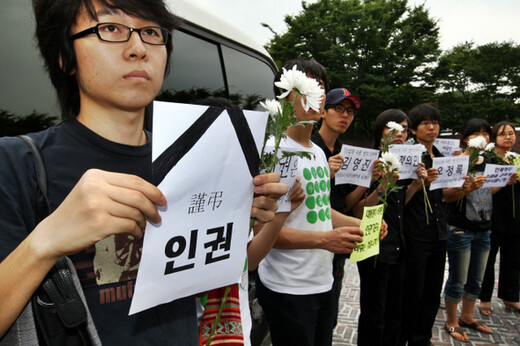hankyoreh
Links to other country sites 다른 나라 사이트 링크
Supreme Court sticks to its position on imprisoning conscientious objectors

Despite a number of recent cases in which lower courts have found conscientious objectors innocent, South Korea’s Supreme Court has once again confirmed its position that conscientious objectors may be prosecuted.
The second panel of the Supreme Court, with Hon. Ju Hee-dae presiding, announced on Aug. 27 that it had upheld the ruling of a lower court that had sentenced an individual surnamed Ahn, 21, to one year and six months in prison. Ahn was charged with violating the Military Service Act by refusing to enlist. Ahn had argued that, as a Jehovah’s Witness, his beliefs prevented him from using a gun.
“In 2004 and 2011, the Constitutional Court upheld the constitutionality of the clause of the Military Service Act that calls for the prosecution of people who avoid enlisting. Furthermore, objection to military service on grounds of conscience is not one of the ‘legitimate reasons’ provided for exempting such individuals from prosecution. Neither does prosecuting individuals for these reasons infringe upon the freedom of conscience that is guaranteed by the constitution,” the court said.
“While South Korea is a member of the International Covenant on Civil and Political Rights, this does not imply that those who refuse military service on grounds of conscience have a right to be exempted from the provisions of the Military Service Act. While the United Nations Human Rights Committee may have recommended that conscientious objectors be provide with alternate forms of service, this recommendation does not have any legal force,” the court added.
A full session of the Supreme Court addressed a similar case in 2004, when it also upheld the guilty verdict. Following this precedent, lower courts have sentenced conscientious objectors to one year and six months in prison, which is the minimum sentence that enables them to avoid their military service. The law prescribes no more than three years in prison to those who refuse to serve in the military.
But recently, there has been a string of “not guilty” decisions from lower courts.
On Aug. 13, Hon. Hwang Jae-ho, a judge in the Suwon District Court, found two individuals not guilty who had refused to join the army because of their religious beliefs. “Objecting to military service on the grounds of conscience is worth defending since it is based on the freedom of expression that the constitution guarantees. Furthermore, it neither interferes with the function of the state nor infringes upon the rights of other people,” Hwang said.
The day before, Hon. Choi Chang-seok, a judge at the Gwangju District Court, found a conscientious objector not guilty. So far this year, three lower courts have cleared conscientious objectors of charges against them.
Courts have also continued to petition the Constitutional Court to review the constitutionality of the sections of the law that punish conscientious objectors in the same way as ordinary draft dodgers.
While the Supreme Court has yet to change its position, the Constitutional Court is taking up the issue again, leading to speculation about what decision it will make. The Constitutional Court upheld the constitutionality of the relevant section of the National Service Act on two occasions, in 2004 and 2011, but on July 9 it held a public hearing on a petition for a constitutional review and has once again began deliberations.
During the hearing, government attorneys and counselors for the petitioners both agreed on the need to introduce a system of alternate service, but they were at odds over when and how such a system should be implemented.
By Lee Kyung-mi, staff reporter
Please direct questions or comments to [english@hani.co.kr]

Editorial・opinion
![[Column] Season 2 of special prosecutor probe may be coming to Korea soon [Column] Season 2 of special prosecutor probe may be coming to Korea soon](https://flexible.img.hani.co.kr/flexible/normal/500/300/imgdb/original/2024/0426/3317141030699447.jpg) [Column] Season 2 of special prosecutor probe may be coming to Korea soon
[Column] Season 2 of special prosecutor probe may be coming to Korea soon![[Column] Park Geun-hye déjà vu in Yoon Suk-yeol [Column] Park Geun-hye déjà vu in Yoon Suk-yeol](https://flexible.img.hani.co.kr/flexible/normal/500/300/imgdb/original/2024/0424/651713945113788.jpg) [Column] Park Geun-hye déjà vu in Yoon Suk-yeol
[Column] Park Geun-hye déjà vu in Yoon Suk-yeol- [Editorial] New weight of N. Korea’s nuclear threats makes dialogue all the more urgent
- [Guest essay] The real reason Korea’s new right wants to dub Rhee a founding father
- [Column] ‘Choson’: Is it time we start referring to N. Korea in its own terms?
- [Editorial] Japan’s rewriting of history with Korea has gone too far
- [Column] The president’s questionable capacity for dialogue
- [Column] Are chaebol firms just pizza pies for families to divvy up as they please?
- [Column] Has Korea, too, crossed the Rubicon on China?
- [Correspondent’s column] In Japan’s alliance with US, echoes of its past alliances with UK
Most viewed articles
- 1[Column] Season 2 of special prosecutor probe may be coming to Korea soon
- 2‘We must say no’: Seoul defense chief on Korean, USFK involvement in hypothetical Taiwan crisis
- 3Is N. Korea threatening to test nukes in response to possible new US-led sanctions body?
- 4Division commander ordered troops to enter raging flood waters before Marine died, survivor says
- 5Amnesty notes ‘erosion’ of freedom of expression in Korea in annual human rights report
- 6Is Japan about to snatch control of Line messenger from Korea’s Naver?
- 7No good, very bad game for Korea puts it out of Olympics for first time since 1988
- 8[Editorial] Korea’s surprise Q1 growth requires objective assessment, not blind fanfare
- 9N. Korean delegation’s trip to Iran shows how Pyongyang is leveraging ties with Moscow
- 10Korea’s 1.3% growth in Q1 signals ‘textbook’ return to growth, says government